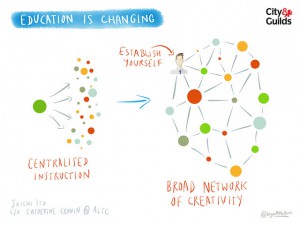
CopyrightX is an online course organised by the Berkman Center for Internet and Society and Harvard University. The course is Prof. William Fisher’s take on the Massive Open Online Course (‘MOOC’) model, with a model that is far more interactive and hands-on that most MOOCs – a ‘networked course‘, as Prof. Fisher puts it. The course includes a residential course on copyright law taught by Prof. Fisher in Harvard and affiliate courses that are taught in affiliated universities, and an online course that is taught by a Harvard Teaching Fellow. The affiliated course in India is currently being taught by Prof. Arul Scaria at NLU-Delhi. I am participating in the online course myself and can testify to its brilliance, and was also lucky enough to attend a discussion between Prof. Fisher and Christopher Bavitz about the idea and the future of the course, and about the importance of open education, which is summarized very well here. CopyrightX is (to my knowledge) one of the very first open-access distance-learning courses on Intellectual Property, bringing together international and domestic copyright law expertise for its students, and is doing brilliant job of it.
I am extremely happy to bring to our readers a detailed post on CopyrightX by Aarohan Bansal, one of our readers who is also currently participating in the course. Aarohan works at a Delhi-based law firm, and is actively involved in intellectual property prosecution and enforcement.
Title: CopyrightX
Author: Aarohan Bansal
I recently had the chance to participate in an online course created in conjunction with Harvard Law School, the HarvardX distance-learning initiative, and the Berkman Center for Internet and Society. The course, CopyrightX (available at copyx.org) is a networked course lasting 12 weeks, and was first offered in 2013 as a teaching experiment, consisting of recorded lectures, assigned readings, weekly seminars, interactive webcasts and discussions, all aimed at teaching copyright law. What differentiates the course from the vast number of courses available online is that the number of seats is limited, a final exam is administered and that there is actual interaction with assigned teaching fellows. The course is open to both lawyers and non-lawyers, and indeed, a significant number of the students do not possess any formal education in law, but belong to affected industries, such as music, photography, arts, publishing.
I participated in the 2015 version of the course. In applying for the course, I was surprised to know that I had to submit an essay, as well as answer multiple choice questions designed to test aptitude and English proficiency, almost similar to an application to a real-world law school. After a few weeks of waiting, I received an email containing detailed instructions on the course. Every week, I was to view a number of recorded lectures on a given topic, and read assigned cases on the subject material. At the end of the week, at an allotted time, a live interactive discussion would take place for my group. The group to which I was assigned consisted of 20 other students from around the world, all coordinated by a second year Harvard Law student.
Professor Fisher, the Harvard professor who designed the course, has personally recorded the lectures, all of which consist of him standing before you delivering a concentrated hose of information, supplemented with audiovisual materials. You would think that watching lectures in this manner would get very dry, but for the subject matter which is both fascinating & engaging. For instance, I was pleasantly surprised to suddenly find Roy Orbison’s Pretty Woman playing in the middle of a lecture, as Prof. Fisher explains the concept of parody in fair use. The course is divided into 12 modules, each being covered in a week’s time, with lectures being arranged in a manner so as to cover fundamental, theoretical and practical aspects of copyright. The modules also offer a chance to understand the rationale for copyright protection, and to ask if there is scope for reform of the law. Among other teaching aids used, one that bears mention is the interactive mind maps, a web of information concerning copyright rules and theory with links to related material. The pace of the course is very hectic, leaving no room for missing any lectures or assigned readings, as I found out the one week I decided to take a vacation. Running around a hotel, looking for a strong Wifi connection is no fun, I assure you. The live interactive sessions, though sometimes plagued by connection issues, offered a chance to listen to various perspectives from a truly international class including lawyers, librarians, research fellows, students, etc.
CopyrightX is mainly designed with US copyright law in mind, with a few general references to the law adopted by different countries worldwide. As Prof Fisher explains, whether you like it or not, US copyright law pretty much influences the shape of the law in the rest of the world. However, there is an Indian version of the course as well, being taught at the National Law University, Delhi (NLUD), available at h2o.law.harvard.edu/playlists/12922. CopyrightX is also open to anyone who wishes to get a deeper understanding of copyright law, since the lectures and the assigned readings are freely available on their website. If you can’t wait till the next version of the course is offered, the website also contains guidelines for preparing your own course of study at http://copyx.org/content/self-paced-study/.
